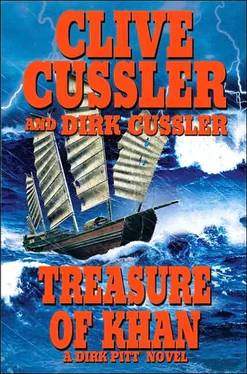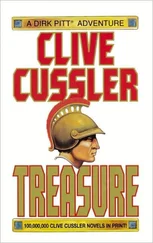It took him a few moments to spot Borjin in the debris. Only his head and part of his torso were exposed from a mound of stones. Pitt walked near as Borjin's eyes fluttered open, dull and listless. A trickle of blood streamed from his mouth, and Pitt noticed the Mongol's neck seemed unnaturally distorted. His eyes gradually focused on Pitt and flashed with a glint of anger.
"Why ... why won't you die?" Borjin stammered.
But he never heard the answer. A muted choke grumbled from his throat and then his eyes glazed over.
His body crushed by his own monument to conquest, Tolgoi Borjin died quickly in the shadow of Genghis Khan.
Pitt stared at the broken body without pity, then slowly lowered the Colt still gripped in his hand. He reached down and unzipped the large pocket on the front of his jacket, then used the moonlight to peek inside. The heavy seismic array operator's manual with metal clipboard was right where Gunn had placed it. Only it was now perforated by a crossbow arrow that penetrated each and every page. The arrow had even dinged the metal clipboard, which had prevented it from ripping into Pitt's heart and killing him instantly.
Pitt walked over to Borjin and looked down at the lifeless body.
"Sometimes, I'm just lucky," he said aloud, answering Borjin's final query.
The collapse of the residence's northern wing had funneled more water into the courtyard. A heavy rush of water now flowed along the perimeter of the sanctuary and threatened to pour into the disintegrating structure. It was just a matter of time before the floodwaters would weaken the ground beneath the sanctuary and wash it down the mountainside. The tomb of Genghis Khan would be destroyed in the carnage, his bones lost for good this time.
Pitt turned to make his escape before any more walls toppled, but hesitated as he glanced through the open rear wall at the corral in back. He turned and gazed again at the tomb of Genghis, which had miraculously survived the collapsing sanctuary intact. For an instant, Pitt wondered if he would be the last man to see the tomb. Then it hit him. It was a crazy idea, he thought, and he couldn't help but grin through a cold shiver.
"All right, old boy," he muttered at the tomb. "Let's see if you've got one more conquest left in you."
The feeling was just returning to Pitt's feet with a painful tingle as he climbed out the back of the sanctuary and into the corral. He staggered to the side and quickly yanked several timbers off the wooden fence to clear an opening. Tossing boxes and crates aside, he burrowed a wide path through the junk and debris until he reached his objective, the dust-laden old car.
It was a 1921 Rolls-Royce Silver Ghost open tourer, with a custom body by the English coachmaker Park Ward. Decades of dirt and grime covered a unique eggplant purple body paint. Long since faded, the color once complemented the car's burnished aluminum hood and wheel covers. More familiar on the streets of London, Pitt wondered how such a grand auto had ended up in Mongolia. He then recalled that T. E. Lawrence had acquired a Rolls-Royce armored car built on a 1914 Silver Ghost chassis, which he used in his desert campaign against the Turks in Arabia. Pitt wondered if the car's reputation for durability in the desert had reached the Gobi years before. Or perhaps a car built before the Mongolian revolution was the only vehicle of opulence that the Communist Party would allow Borjin's family to own.
None of that mattered to Pitt. What did matter was that the Rolls had a silver-handled crank protruding from its snout. Equipped as a backup for the early electric starters, the crank gave Pitt a small hope that he could start the car, even with a long-dead battery. Provided, that is, that the engine block wasn't frozen solid.
Pitt opened the right-side driver's door and placed the gearshift in neutral, then stepped to the front of the car. Leaning down and grabbing with both hands, he pulled up on the crank, driving with his legs. The crank held firm, but Pitt grunted out a second effort and the handle inched upward. He rested for a second, then gave another heave. The crankshaft broke free with the extra push, driving the six pistons up and down in their cylinders.
With his own small collection of antique cars at home in Washington, Pitt was well versed with the intricacies of starting up a vintage vehicle. Climbing back into the driver's seat, he adjusted the throttle, spark, and governor controls, which were set by movable levers mounted on the steering wheel. He then opened the hood and primed a tiny pump on a brass canister, which he hoped contained gasoline. He then returned to the crank and proceeded to manually turn the engine over.
Each pull of the crank led to a series of rasps as the old motor tried to suck in air and fuel. Zapped by exposure to the cold, Pitt's strength waned on every pull. Yet he willed himself to keep trying in the face of each dying wheeze from the engine. Then on the tenth pull, the motor coughed. Several more pulls produced a sputter. With his feet frozen, yet beads of sweat on his brow, Pitt heaved again on the crank.
The crankshaft spun, the air and fuel ignited, and with a put-put-put sound, the engine labored to life.
Pitt rested briefly as the old car warmed up, spouting a thick cloud of black smoke out its rusty exhaust pipe. Rummaging around the corral, he found a small barrel filled with chains, which he tossed in the backseat. Taking his place in the driver's seat, he slipped the car into gear, released the clutch with his numb left foot, and drove the Rolls shakily out of the corral.
It's been well over an hour," Gunn remarked, looking glumly at his watch.
He and Giordino stood on the rise, watching the scene of devastation below. The laboratory fire burned in a blazing tempest, consuming the entire building and adjacent garage. Black smoke and flames leaped high into the sky, casting a yellow glow over the entire compound. Across the landscaped grounds, a large chunk of the residence was missing, replaced by rushing water where the northern wing of the house previously stood.
"Let's take a quick drive down," Giordino said. "Maybe he's injured and can't walk out."
Gunn nodded. It had been almost an hour since they heard the automatic fire from inside. Pitt should have made it out long ago.
They started to walk toward the car when a low rumble shook from below. No earthquake this time, they knew, but rather the erosive effects of the flooding waters. They stopped and stared, dreading what they knew was next. From their vantage, it resembled a collapsing house of cards. The northern end of the structure began toppling one wall at a time. The structural failure seemed to build momentum, moving across the residence in a rippling wave of destruction. The central section of the residence simply folded in on itself with a grinding crash, then disappeared under the water. The large white spire over the entrance melted away, disintegrating into a thousand bits under the floodwaters. Gunn and Giordino could only see chunks of debris poking through the water as the bulk of the residence slid off its ledge and washed down the mountain. In just a few seconds, it was gone. Only a small section of the southern wing survived, standing next to a wide flow of water where the rest of the house had once stood.
With the destruction of the house, all hopes for finding Pitt alive had vanished. Gunn and Giordino knew that no one in and around the residence could have survived. Neither man said a word nor made a move.
Together, they stood and solemnly stared at the altered river as it glided over the foundation of the house and roared down the cliffside beyond. The rushing of the wild waters competed with the crackling from the lab fire to disrupt the otherwise quiet late-night hour. Then Gunn's ears detected another sound.
Читать дальше












